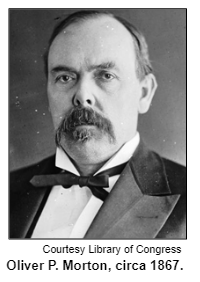Feb 1, 2019
(January 26, 2019) He's been called the most consequential Indiana governor in state history. And a towering bronze statue of Gov. Oliver P. Morton stands in front of the Indiana State Capitol building.
But Morton - an ally of Abraham Lincoln who came close to being the Republican nominee for U.S. president in 1876 - was a controversial figure. Critics have contended that Morton (1823-1877) was practically a dictator who abused his powers as governor during the Civil War.
To explore the impact and colorful life of Morton, who served as a U.S. senator representing Indiana following his stint as governor, Nelson is joined by two distinguished guests:
- James Fuller, a history professor at the University of Indianapolis and the author of a new book, Oliver P. Morton and the Politics of the Civil War and Reconstruction (Kent State University Press), the first full-length biography of Morton to be published in more than 100 years.
- And Ron Morris, a history professor at Ball State University who is restoring Morton's home on the Old National Road (now U.S. 40) in Centerville, Ind. In 2012, Ron purchased the two-story house, which was built in 1848 and had been deteriorating badly.

"His critics blasted him as a ruthless tyrant," Jim Fuller writes, noting that Morton was accused of exaggerating the threat of Copperheads and other Southern-sympathizing groups in Indiana as a means of rallying support for his expanded powers. He was also accused of misusing public funds and initiating "treason trials" in Indianapolis against his opponents.
Before the Civil War, Morton had been an attorney, practicing law in the house that Ron Morris is restoring. Morton was one of the early organizers of the Republican Party in Indiana and, before that, had helped form its predecessor, the People's Party.

Thanks largely to Morton's dedication to the Northern cause during the Civil War, Indiana ranked second in the percentage of men of military age serving in the Union Army.

Elected to the U.S. Senate in 1867, Morton championed the rights of African Americans newly freed from slavery in the South and called for a Constitutional amendment to abolish the Electoral College. After suffering a second stroke, he died in Indianapolis in 1877 and is buried in Crown Hill Cemetery, "next to the Union soldiers for whom he had done so much," Jim Fuller notes.
Morton and his wife, Lucinda Burbank Morton, sold the house in Centerville in 1863. Our guest Ron Morris has been restoring the stately house - the only one of Morton's residences that still stands - to what it would have looked like during the 1849-1862 period.